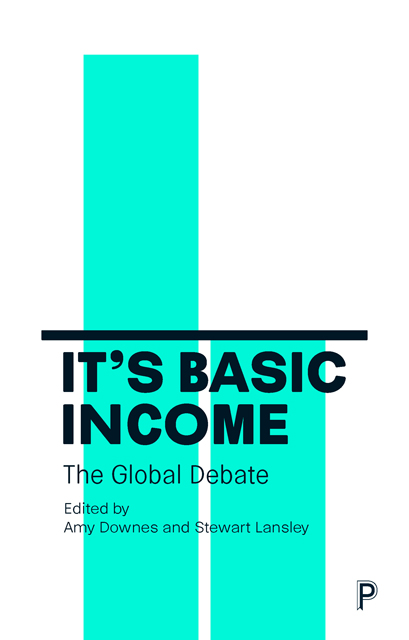Introduction
Published online by Cambridge University Press: 11 April 2023
Summary
A few years ago, the idea of a universal basic income was widely dismissed as eccentric, as little more than a utopian pipedream. Since then, there has been a significant upsurge in interest, taking the idea from the fringes and up the political agenda in a number of countries.
A universal basic income (UBI) would see a tax-free, unconditional and non-contributory weekly income paid to every individual as of right, irrespective of how much they earned or their work status. Aimed at guaranteeing a no-strings-attached minimum, secure income for all, whatever their circumstances, a UBI would aim to replace at least part of existing national social security systems and would involve a profound revolution in the way income support is organised in most countries.
In the case of the UK, it would constitute a significant extension of the universal model of welfare and, by lowering dependency on means-tested benefits, would relieve the problems of low take-up, the poverty trap and stigma associated with the current system. It would be cheaper to administer, and would save large sums currently spent on processing claims, policing benefit claimants and assessing eligibility.
The idea of a UBI has a long pedigree. The earliest known debate on its essential principles came in 483bc with the discovery of a rich seam of silver in ancient Athenia. The find triggered an intense public discussion about how the potential revenue stream should be spent. One proposal was that it should be distributed among all 30,000 citizens in a regular and equal citizen’s dividend, a move that would have transformed the nature of Athenian society. In the event, the Athenian Assembly voted against the path-breaking idea and, instead, the windfall was used to expand the Athenian navy.
In 1516, the social philosopher, Thomas More, floated the idea of a regular basic income as of right in his fictional fantasy Utopia. In 1797 the British-born champion of democracy, Thomas Paine, called for every person to be paid, at the age of 21, a sum of £15 and for those over 50, the sum of £10. ‘It is a right’, he emphasised, ‘and not a charity’. This sum, he argued, would come from a national fund financed from a charge on the ownership of land, thereby ensuring that part of the benefit of that ownership would be shared among all citizens.
- Type
- Chapter
- Information
- It's Basic IncomeThe Global Debate, pp. 1 - 11Publisher: Bristol University PressPrint publication year: 2018



